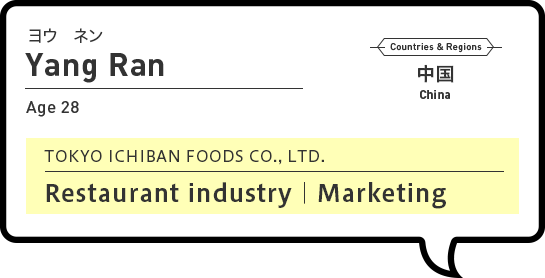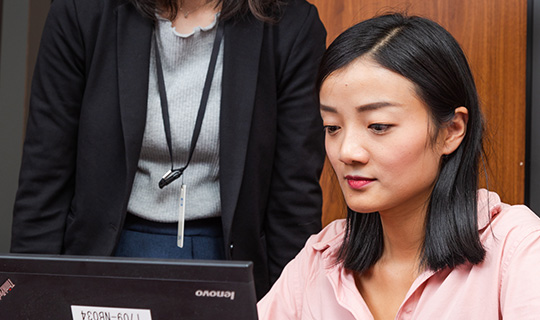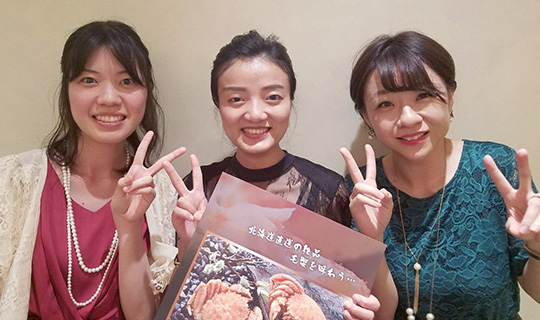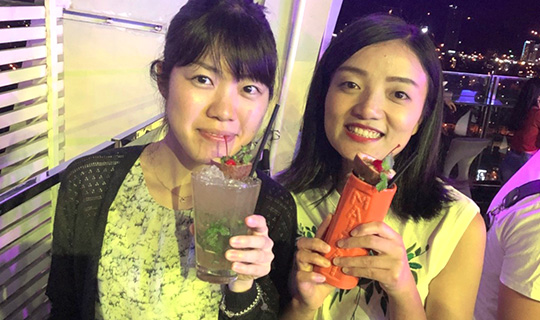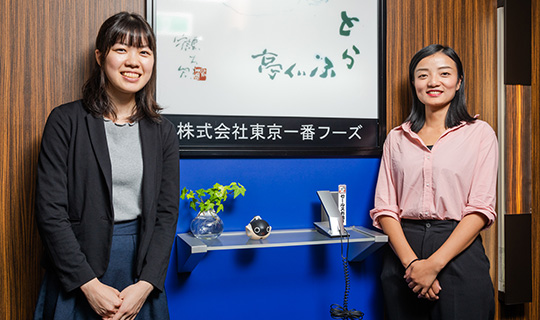![]()

-
Age10
Japanese cartoons were very popular when I was at elementary school. Watching Slam Dunk made me discover their appeal and led to me to watch other kinds of anime, which sparked an interest in all things Japanese. -
Age17
I went with my family on a trip to the Kansai area of Japan. We visited Osaka and Kyoto, and I was particularly impressed with the beauty of Kyoto. -
Age19
I once went to university in China but decided midway through that I wanted to go overseas for a change of scenery. I chose Japan because it seemed such a safe place. -
Age24
My friends suggested Tokyo, and I figured there was a higher chance of finding work in the big city. Sure enough, after I started looking, I managed to find the job where I am now. -
Age27
I spent my first year at a restaurant in Shinjuku Annex before moving across to a restaurant in Ginza. About halfway through the second year I started an in-house internship at the Business Promotion Division, where I still work and help develop the customer base.
An understanding of Japanese culture, acquired through your work or through looking for a job, will surely be useful in the future.
If you want to work in Japan, you need to pass the Japanese Language Proficiency Test at N1 level. The test may be difficult, but you'll need good language skills to deal directly with customers. Our restaurants cater to wealthy customers so language proficiency is particularly important. The ability to speak English is also useful.
You'll have many opportunities to study the Japanese culture of consideration for others, both in your work and when you're trying to find work. And this will definitely be of great use to you after you go back home, or if you move to another country. For starters, try to make Japanese friends whom you can talk to on a regular basis. This will help to improve both your language skills and your knowledge of Japanese culture.
I was acutely aware of cultural differences at first, but now it's not an issue at all. As we speak, my colleagues and I are facilitating a healthy and enjoyable workplace for everyone.
Currently engaged in all three sectors, Tokyo Ichiban Foods is growing to be a “diversified fishery industry.” We started out as a restaurant specializing in globefish cuisine before expanding into aquaculture (primary sector), processing and distribution (secondary sector), and restaurants and retail (tertiary sector).
My current role involves marketing targeted at international visitors to Japan. My goal is to find ways to boost customer numbers. To this end I analyze tours and visit our partners and affiliates to learn about customer expectations and requirements. I also open up new channels for increasing sales. I talk with our partners and affiliates to gauge the level of satisfaction of customers who have dined at the restaurant, and then present this feedback to the staff of our partners for improvement. Up until last year I was working under supervision, but now I'm on my own.
When I first joined the company, I was acutely aware of the cultural differences between Japan and China in my interactions with other employees. But now, although gradually, I find it much easier to communicate through the work I do. I think I'm a pretty upbeat type of person, and I'm now working with my colleagues to facilitate a healthy and enjoyable workplace for everyone.
Tokyo is the best place to working-so much to see and do, so much to experience, and so many job opportunities.
The population is quite young, and many work opportunities are available. Particularly if you want to pursue a career in the global arena, Tokyo is the place to be because there are so many other foreigners working here.
I am surrounded by non-Japanese who are thinking about starting their own businesses, as well as Chinese nationals whom we currently have dealings with. If you want to work in the international sphere, you should try to get a job in Tokyo. Tokyo is where all the best and brightest go and where all the jobs are, so it's a really exciting place to be.
And it's great to experience firsthand the world-renowned Japanese culture of hospitality, which is demonstrated through the polite and courteous treatment of customers. The restaurant in Ginza, where I used to work, had many international customers. At that time, I was able to utilize my language skills when the local staff were unable to communicate with them effectively. The Olympics are expected to bring a huge influx of overseas visitors to Japan, which should translate into a growth boost for our company.
I was impressed by the culture of hospitality in the restaurant industry in Japan.
Japanese cartoons were very popular when I was at elementary school. Watching Slam Dunk made me discover their appeal, which sparked an interest in all things Japanese.
After that, when I was in high school, I went with my family on a trip to the Kansai area of Japan. We went to Osaka and Kyoto, and I was particularly impressed with the beautiful city of Kyoto. I entered a university in China but decided midway through that I wanted a change of scenery. I wanted to broaden my horizons by going overseas. So I decided to study in Japan (Kyoto), one of the safest countries in the world.
When it was time to look for a job, a friend suggested that I work in Tokyo, and I figured there was a higher chance of finding work in the big city. I had always wanted to find work in the global arena. I went to presentations from lots of different companies, and that's how I came across Tokyo Ichiban Foods. I was impressed with their explanation of their diversified industry and immediately decided that I wanted to work there.
I was also very attracted to the idea of being a part of the renowned Japanese hospitality and courtesy in the restaurant industry. I hope one day to be able to instill a similar culture in China.
The other thing about the food industry is the sense of permanence: people still have to eat, even in times of economic upheaval such as financial crises. Restaurants and eateries will always be around, and I think there is considerable growth potential for this sector in Japan given the steady increase in inbound tourist numbers. What made me finally decide to work for Tokyo Ichiban Foods is their activities aimed at overseas expansion.
Tokyo, home of fine cuisine from around the world
As the largest city in Japan, Tokyo is the center of cultural life, a place where you can find all there is to know about Japan. It also has a thriving retail sector selling a comprehensive range of products, as well as countless convenience stores providing ready access to all the necessities of daily life.
And of course, there is a veritable plethora of leisure options too. I particularly like going to international events, and there are many of these in Tokyo, which gives me plenty of opportunities to join and indulge my passion.
Tokyo is also home to many excellent restaurants. If you like Chinese food, you'll find some of the leading Chinese restaurants in Tokyo. There are also a lot of restaurants that operate only in Tokyo, and the capital is also home to many great bars or pubs. Sometimes I go to a bar with people from work after we've finished for the day. We have a great time drinking and talking about work-related stuff as well as other things.
I'm part of a travel club at work, and we often go on short trips on our days off. You can get to lots of places easily from Tokyo, making it perfect for day trips.
Interviews with Corporations
Acting Manager Natsuki Abe
The experience of testing your capabilities in the intensely competitive environment of Tokyo is one that will benefit you in the long run
Tokyo is a thriving hub of people and all sorts of things. There is so much to choose from that sometimes it's hard to make a choice. Working in Tokyo can be a real test of your abilities. For example, at Tokyo Ichiban Foods, we see every new university graduate we hire as a potential manager or senior executive. It may be a couple of years or so, but the experiences you accumulate now by working for a business in Tokyo will be of benefit to you 10 years from now. Therefore, surviving the ups and downs of Tokyo is a really good experience especially for young people in their twenties.
We opened our first restaurant in New York last year, and we've had good sales growth so far. If our overseas restaurants and fishery operations do well, the company might even get big enough to open a restaurant in China. The aim is not just to open as many restaurants as possible; the restaurants are central to the expansion of our international seafood wholesaling network. Our president speaks of his vision to become so big with so many different departments that every employee will be a manager.
So that's our vision: to grow so big that every single one of our current 200 employees can be the manager of their own section. The first step is to ensure that all employees are aware of the corporate culture and that they thrive in the competitive environment of Tokyo. To this end, it is important for all employees to have their own personal vision for the future. We want them to inculcate inquisitiveness and independence that will enable them to work anywhere—not just in China or Japan.



